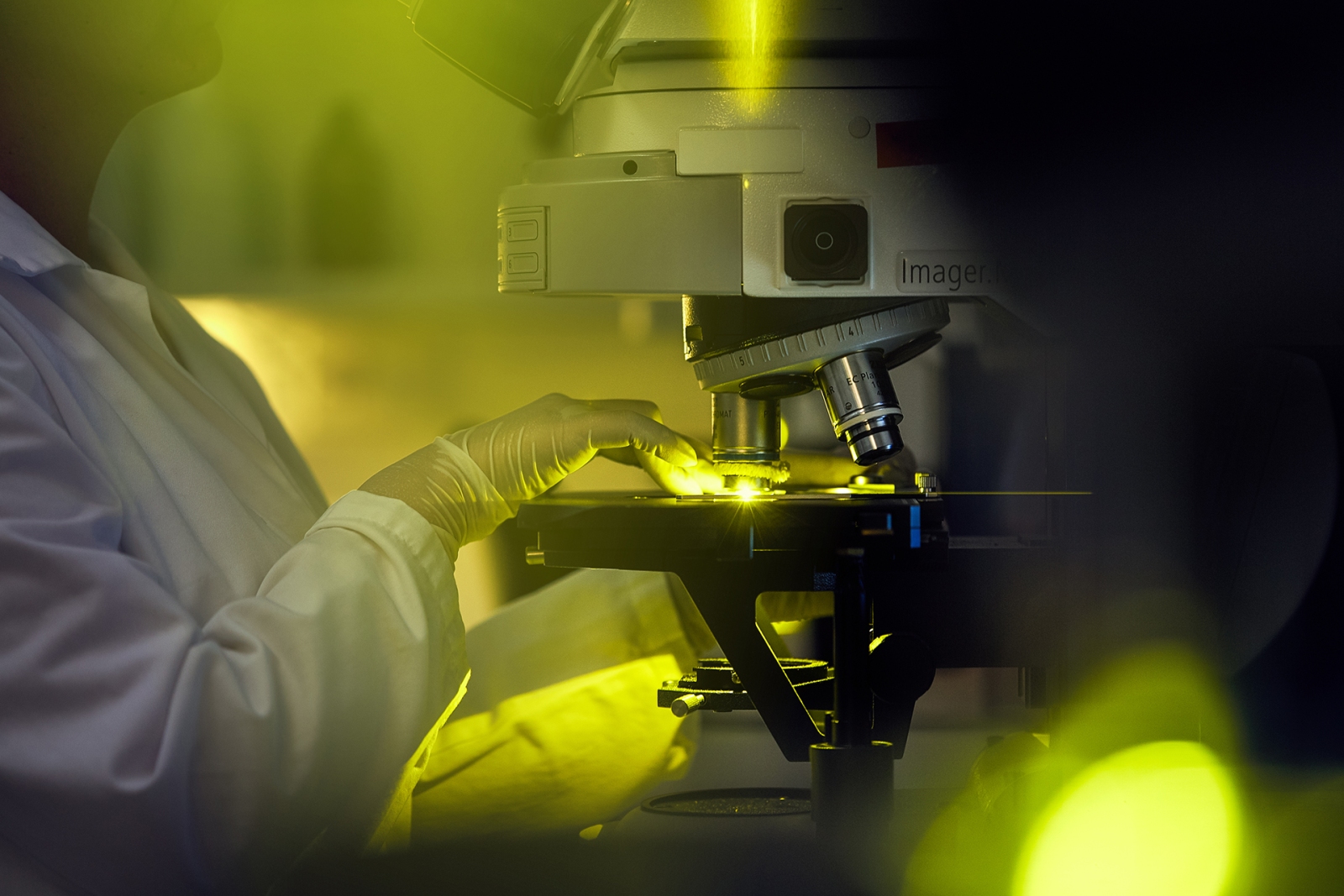
News
Stay up to date. The MLL Munich Leukemia Laboratory stands for innovation and the best leukemia diagnostics. Here you will find the latest research and study results related to hematological diagnostics and the therapy based on them, as well as other exciting news and events.
The magazine
Roman Möhlmann
at 28.06.2024
Recognition: Sixth consecutive TOP 100 award for the MLL
[Press release] Recognition at the German SME Summit - Ranga Yogeshwar honors MLL Munich Leukemia Laboratory for innovative achievements.
Roman Möhlmann
at 25.06.2024
MLL Delegation visits Mayo Clinic and ARUP Laboratories
Following the visit of a delegation from Mayo Clinic Laboratories to MLL Munich Leukemia Laboratory in February and a group from ARUP Laboratories in October, a team from MLL has now traveled to the USA. A total of seven MLL representatives set off to visit the laboratories of the renowned Mayo Clinic Group in Rochester and the well-established ARUP Laboratories in Salt Lake City. Seven days and five flights later, they have a lot to tell.
Roman Möhlmann
at 24.04.2024
Help for Ukrainian hematology care
Healthcare in times of war: The MLL Munich Leukemia Laboratory supports the "Help for Ukrainian Hematology Patients" network, a global initiative for the hematological care of patients in Ukraine. As part of the project, blood or bone marrow samples from Ukraine are sent to the MLL on a weekly basis and the senders receive the results free of charge within a few days. So far, 1200 samples and over 4800 different analyses have been collected.
Roman Möhlmann
at 20.03.2024
Minister of State Gerlach visits the MLL
Bavaria's Minister of Health Judith Gerlach visited MLL to find out about current trends and topics in technology-supported diagnosis and therapy. (Press Release)
Roman Möhlmann
at 22.02.2024
New framework conditions, new opportunities: Health Data Utilization Act, Digital Act, research data rooms and their consequences
The use of patient data from diagnostics and therapy holds potential for medical progress. The last few months have also been dominated by digitalization and artificial intelligence in the healthcare industry, and the turn of the year 2023/2024 was also characterized by numerous innovations in the legal and regulatory environment.
Dr. rer. nat. Christine Käppel
at 22.02.2024
Quality and sustainability are very important at MLL
Through rapid and targeted leukemia diagnostics, MLL works every day to provide patients worldwide with the best therapy. The focus here is on the quality of the analysis results. In addition, the MLL strives to fulfill its tasks in an environmentally friendly and sustainable manner. Read the article to find out how quality and sustainability are compatible at MLL.
Dr. rer. nat. Veronika Ecker
at 25.06.2024
Flow Cytometric MRD Measurement in CLL
The immunophenotyping team at MLL has validated a new ERIC-compliant flow cytometric antibody panel for routine use to expand MRD diagnostics in CLL. All relevant background and information can be found in our recent article.
Dr. rer. nat. Katharina Hörst
at 25.06.2024
Risks Following Autologous Transplantation for Hodgkin's Lymphoma: Clonal Hematopoiesis and Therapy-related Myeloid Neoplasia
New Horizons in Leukemia Research: Selected Papers in Focus: Do specific mutations associated with clonal hematopoiesis in peripheral blood stem cells (PBSC) increase the risk of therapy-related myeloid neoplasia in patients with Hodgkin's lymphoma after transplantation? Yan et al. investigated this question in the study presented.
Dr. rer. nat. Constanze Kühn
at 24.04.2024
Impact of CEBPA mutation patterns on prognosis in adults with acute myeloid leukemia (AML)
New horizons in leukemia research - selected papers in focus: New findings on the prognostic significance of CEBPA mutations in adults with acute myeloid leukemia (AML) show that biallelic mutations are associated with a more favorable disease course. The study by Georgi et al. sheds light on the complex interactions between CEBPA mutation subsets and other genetic alterations to better assess risk and treatment outcomes for disease progression.
Dr. rer. nat. Constance Bär
at 24.04.2024
New possibilities for more sensitive investigation of measurable residual disease (MRD)
Measurable residual disease (MRD) is an important biomarker in acute myeloid leukemia (AML), an indicator of prognosis and response to therapy. In this article, we explain how mutations in AML and other diseases can be detected with a sensitivity of 0.1%. From July 2024, we will offer a corresponding panel and thus expand our portfolio for follow-up examinations.
Dr. rer. nat. Constanze Kühn
at 22.02.2024
More precise relapse prognosis for CML patients: Cell line-specific detection in measurable residual disease
A new study by Pagani et al. examines the role of cell line-specific measurement of BCR::ABL1 transcripts by quantitative PCR in different immune cell populations with a view to more precise methods for predicting relapse after the end of therapy. According to the study, the detection of BCR::ABL1 DNA in granulocytes and T cells after discontinuation of therapy could be a better predictor of relapse than detection in total leukocytes.
Dr. rer. nat. Constanze Kühn
at 20.12.2023
MLL at the 65th ASH Annual Meeting & Exposition - a follow-up report
From December 9-12, 2023, the 65th Annual Meeting & Exposition of the American Society of Hematology (ASH) took place in San Diego, California - and MLL was represented again this year. We have summarized highlights of the 15 MLL contributions at the ASH for you in this article.
Dr. rer. nat. Isolde Summerer
at 06.10.2022
Chromosome Analysis 5.0 – Automation, Digitization and Artificial Intelligence
Chromosome analysis is an essential part of the diagnostics of malignant hematological diseases. It plays an important role in confirming the diagnostics, classification, prognosis assessment and therapy planning. The method is considered time-consuming and demanding, both laboratory-wise and in terms of evaluation and reporting. In addition to the continuous expansion of the automation of laboratory processes, the use of artificial intelligence (AI) in chromosome analysis in particular enables a significant reduction in the reporting time as well as a more objective and sensitive assessment of chromosomal changes.
Dr. rer. nat. Constanze Kühn
at 16.08.2021
MTLAs, doctors and artificial intelligence at MLL – a good team!
Dr. med. Christian Pohlkamp
at 06.08.2021
MLL and Institute of AI for Health of the Helmholtz Center of Munich Announce Research Collaboration
Prof. Dr. med. Dr. phil. Torsten Haferlach
at 30.09.2020
BELUGA - A Prospective, Registered Study on the Use of Artificial Intelligence (AI) in Hematology
at 18.02.2020
The Use of Artificial Intelligence at MLL Munich Leukemia Laboratory
Niroshan Nadarajah
at 18.11.2019
MLLi:ir - A diagnostic interpretation report for NGS data
Dr. Wencke Walter
at 11.01.2024
Research Report 2023
This year was marked by various challenges, including war, natural disasters, and inflation, yet we managed to make significant strides in research. Our research report reflects the tireless dedication and innovative spirit of MLL's team as we continue to push the boundaries of knowledge in the field of hematology.
Dr. Wencke Walter
at 09.01.2023
Research Report 2022
Those who know us know that we always look ahead, push boundaries, and rarely stand still. We have reviewed the last scientific year and summarized our research highlights in the new Research Report 2022. Feel free to get caught up in our own passion and immerse yourself in our research with us. In 2022, we were once again energized, curious, and enthusiastic about advancing the best possible leukemia diagnostics for our patients. To further facilitate reading and to better convey our data, we have included various graphical representations and summaries and we hope you enjoy the content.
Dr. Wencke Walter
at 15.03.2022
Leukaemia diagnosis – Realising the potential of whole transcriptome sequencing
In AML and ALL the application of WHO classification and ELN guidelines requires a plethora of methods to determine the diagnostic and prognostic subgroup. Especially in ALL, many different subtypes have been described, which makes accurate diagnosis a challenge. However, in recent years, whole genome and whole transcriptome sequencing have emerged as comprehensive high-throughput techniques that allow for an accurate genetic characterization. This identification of patients’ genetic fingerprint is key to a precise diagnosis and the design of personalised cancer treatments.
Dr. Wencke Walter
at 28.12.2021
Research Report 2021
Dr. Wencke Walter
at 10.02.2020
Genomic & Transcriptomic Data Visualization
Dr. Wencke Walter
at 04.12.2019
Analysis of pharmacogenomic variants by WGS data for AML patients with altered response to treatment
03.07.2024
Onkologisches Symposium 2024
Die Trillium Akademie lädt Sie herzlich zum sechsten Onkologischen Symposium ein. Unter dem Motto „Vom Biomarker zur Therapie“ findet die Veranstaltung am Freitag, den 8. November 2024, bei uns im MLL Münchner Leukämielabor statt. Das Symposium wird im hybriden Format angeboten (vor Ort und im Livestream). Alle Infos zur Anmeldung, zum Programm und zu unserem Rabattcode finden Sie hier.
Dr. rer. nat. Sabine Riedel
25.06.2024
Qualification on the highest level: further education and training at the MLL
In addition to its medical and scientific work, the MLL is committed to providing regular training opportunities for specialists. This year, the MLL already hosted two attractive training courses: In April, the MLL Academy provided information on the latest developments and methods in leukemia diagnostics, while in June, an event was dedicated to the therapy and diagnosis of sickle cell disease and thalassemia.
12.04.2024
Fortbildung 2024
Das MLL und die LMU Ludwig-Maximilians-Universität (Medizinische Klinik und Poliklinik III) laden zu einer Fortbildung zum Thema "Sichelzellkrankheit und Thalassämien - Diagnostik und neue Therapiekonzepte" am 19.06.2024 ein. Hier geht's zur Anmeldung
29.03.2024
Sobi Hämatologie-Gespräche
Wir laden herzlich zur Neuauflage der Sobi Hämatologie-Gespräche in das MLL Münchner Leukämielabor ein.
22.02.2024
Training for our senders and referring physicians 2024
Save the Date: The MLL and the LMU Ludwig-Maximilians-University (Medical Clinic and Polyclinic III) invite you to an advanced training course on "Sickle cell disease and thalassemia - diagnostics and new therapy concepts" on June 19, 2024 from 5:00 to 7:00 pm. Participation will be possible on site or virtually, further information will follow shortly (language: German).
20.12.2023
MLL Academy 2024
The next MLL Academy will take place from 22.04. to 24.04.2024. In the three-day workshop on the topic: "State of the art diagnostics in hematological malignancies", the twelve participants can expect a mix of theoretical and practical content as well as joint discussion rounds on the diagnosis of leukemias and lymphomas. Registration is possible until 01.03.2024 (Language: German).
You may also be interested in
Your contact person

»Transparent communication both internally and externally is important to us.«
Roman Möhlmann